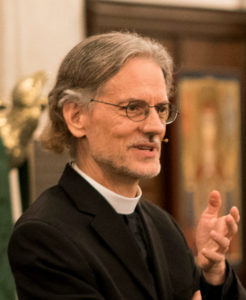An Ordinary Person
C. S. Lewis, a character in his own story, saw her approaching from afar. She was radiant. Leading her were bright angels, joyous children, and musicians. Multitudes of animals followed after. It was a great procession coming down from the high country.
Lewis thought he was seeing, you know, her, the Virgin Mary. “Is she—?” he asks his guide, who seems to smile at Lewis’s naivete. In earthly life, this woman was ordinary and unknown. Now, in the high country of heaven, she is filled with glory as she lives completely in Love. Her name is Sarah Smith. She lived in Golders Green. Unnoticed to the world, she had been a mother-like friend to all the children who came to her door—and the birds and the beasts also had their place in her love. All who knew Sarah Smith were touched by something that somehow made them more themselves: a simple love that wasn’t “greatness” or “brilliance.” We might call it self-sacrifice, yet they were never made to feel it as such. True self-sacrifice just is self-giving, which in turn lives on the self-giving of divine love.
One imagines she knew their names, that she told stories to the children and delighted them. One imagines she gave them hugs and they gave her hugs back. She may have made clothes for them. None of this was fancy. None of this brought attention to her in anyone else’s eyes. She was, in a sense, a person who passes through life and leaves behind no monuments, no worldly achievements.
The key to the scene is in the children dancing along with her. To be pro-life is (among other things) to notice children, to get to know them, to help them along and be open to friendship with them. How easy it is to do otherwise! There is work that has to be done. There is a home that needs upkeep. There are vacation plans to be made. There are texts that keep popping up, posts that need responding to, news updates we want to keep reading. Where do—how can—children fit into this, our typical life?
There was one person who did not respond to Sarah’s love, and the reason she has come down from the high country is to meet him, her husband, Frank. She finds him, as we see, a split person: a tall tragedian holding a chain on the end of which is a little man. Arriving, she bends down to speak to the diminished remainder of her husband. He speaks of his own sacrifice, insincerely, like a bad actor. Bent down, Sarah lovingly teases him, getting him (almost) to laugh at himself. He nearly begins to glimpse a world without himself at the center of it. But there is only a spark of his humanity left. He is the sort of husband, one thinks, who always resented the things his wife gave away to children. He may have wanted all her love for himself. One thinks, he never paid attention to the children.
In Frank’s case, his eternal destiny hangs on his finding even just a wee bit of something to love other than himself. He would have been more of a person if he had noticed children. His failure to be other than completely self-centered is, it seems, the cause of his vanishing into nonexistence.
These are old truths. We can be famous and yet, in the end, insignificant. Or we can—for instance—pay attention to children. Lewis’s big point in the The Great Divorce, the book (which he called a “dream”) in which this encounter appears, is that at the end there are two kinds of people. There are those who say to God, “Thy will be done,” and there are those to whom God says, “thy will be done.”










